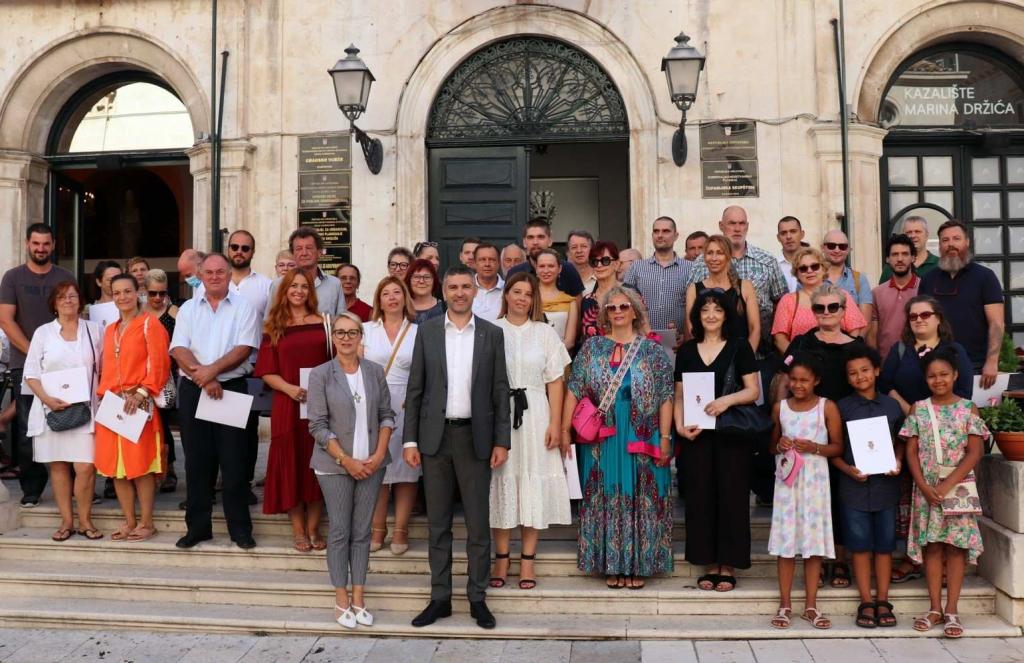Thessaloniki gets ready for its metro launch in November
The underground rapid transit lines have been under construction for almost two decades due to various project delays
 TheMayor.EU logo
TheMayor.EU logo 
Mayor Mato Franković posing with the craftsmen who will receive the grant , Source: City of Dubrovnik
This is an old and beautiful city, but its craftsmen community is what makes it feel real and vibrant
Last week, authorities in Dubrovnik, Croatia, decided to award grants to support 50 craftsmen in the city. The grants function as a sort of universal basic income (UBI), that the craftsmen will receive in monthly instalments, as the city tries to support the local culture.
As Dubrovnik is one of the most visited tourist destinations in the Mediterranean, maintaining and supporting the local culture is a big priority for the local administration. Mayor Mato Franković explained that craftsmen are the backbone of the unique and authentic experience the city has to offer both locals and tourists from abroad.
The city launched its financial support programme for craftsmen back in 2018, however, every year they have expanded both the monthly payments, as well as the number of recipients. In the beginning, the programme was able to reach only 30 craftsmen for six months, now it has grown to support 50 people for a year.
The city allocated around 160,000 euros (1.2 million Croatian Kunas) for the programme. That accounts for about 265 euros per month, per person, for an entire year. People will start receiving the payments from 1 January 2023.
There are a lot of different craftsmen in Dubrovnik, some focused on traditional folk manufacturing, while others use more contemporary techniques. This is why the city has tried to cast a wide net, not focusing too much on any particular craft sector.
This year’s grants were awarded to 11 trades dedicated to producing original souvenirs, local products and handicrafts, seven masons, four goldsmiths, four tailors and four restoration professionals.
Additionally, the city recognised the value of three glass and ceramic producers, three folk dress and doll manufacturers, three tradesmen who make unique jewellery, two mask and carnival costume makers, two iron and metal craftsmen, two men's barbershops and two barcariols (water taxis).
Moreover, authorities also decided to support one hat maker, one embroidery and knitting maker, one shoemaker and an electrician.

The underground rapid transit lines have been under construction for almost two decades due to various project delays

Now you can get your wine in Talence by paying directly in Bitcoin

That’s because the state has to spend money on updating the railway infrastructure rather than subsidizing the cost of the popular pass

Rethinking renewable energy sources for the urban landscape

The examples, compiled by Beyond Fossil Fuels, can inform and inspire communities and entrepreneurs that still feel trepidation at the prospect of energy transition

Now you can get your wine in Talence by paying directly in Bitcoin

The 10th European Conference on Sustainable Cities and Towns (ESCT) sets the stage for stronger cooperation between the EU, national and local level to fast track Europe's transition to climate neutrality.

At least, that’s the promise made by the mayor of Paris, Anne Hidalgo

The underground rapid transit lines have been under construction for almost two decades due to various project delays

At least, that’s the promise made by the mayor of Paris, Anne Hidalgo

Hostal de Pinós is located in the geographical centre of the autonomous region

Despite its church-y name, the district has long been known as the hangout spot for the artsy crowds

Urban dwellers across the EU are having a say in making their surroundings friendlier to people and the environment.

Forests in the EU can help green the European construction industry and bolster a continent-wide push for architectural improvements.

Apply by 10 November and do your part for the transformation of European public spaces

An interview with the Mayor of a Polish city that seeks to reinvent itself

An interview with the newly elected ICLEI President and Mayor of Malmö

A conversation with the Mayor of Lisbon about the spirit and dimensions of innovation present in the Portuguese capital














